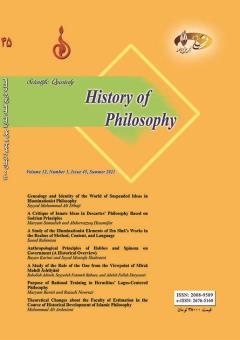A Critique of Innate Ideas in Descartes’ Philosophy Based on Sadrian Principles
Subject Areas : Comparative studies in the field of history of philosophy
Maryam Samadieh
1
*
![]() ,
عبدالرزاق حسامی فر
2
,
عبدالرزاق حسامی فر
2
1 - Assistant Professor, Department of Islamic Teachings, University of Maragheh, Maragheh, Iran
2 - Professor at the Philosophy Department of Imam Khomeini International University, Qazvin, Iran
Keywords: innate ideas, soul, human perception, Descartes, Mullā Ṣadrā,
Abstract :
Descartes believed in the existence of innate ideas in human beings. He maintained that the idea of God is the most important of such ideas which He, similar to a dexterous craftsman, has imprinted on our primordial nature (fitrah). The interpreters of Cartesian philosophy have adopted various methods to interpret the place of innate ideas in Descartes’ philosophy. Based on one of these interpretations, these ideas potentially exist and are present in the soul prior to experiencing them, and their appearance and actuality comes after their sense perception. However, based on another interpretation, the innateness of ideas does not necessarily indicate their permanent presence in the mind as, in this case, no idea can ever be innate. Rather, it means that we are capable of creating such ideas and can perceive their truth through sufficient mental and rational contemplation and needless of the knowledge acquired through the senses. It seems that the first interpretation conforms more to Descartes’ own view as to the potential existence and presence of such ideas. Accordingly, it is inferred that the existence of innate ideas in its Cartesian sense is not consistent with Mullā Ṣadrā’s philosophical principles because he denies the existence of any kind of concept and judgement prior to experiencing them in the mind. Moreover, based on Sadrian principles, the human soul is a corporeal substance void of any kind of concept and judgement at the beginning of its creation, but it gradually develops through its trans-substantial motion until it reaches the level of intellectual immateriality.
امید، مسعود (1387) «نظریة فطرت؛ سیر تاریخی در غرب از یونان تا دوره معاصر»، مجله معرفت فلسفی، سال 5، شمارة 4، ص 242ـ 193.
انشایی، مهدی؛ جوادی، محسن (1399) «تحقق نفس قبل از بدن در نظریه حدوث جسمانی»، دوفصلنامه¬ حکمت صدرایی، سال 8، شمارة 2، ص 90ـ 75.
دکارت، رنه (1372) قواعد هدایت ذهن، ترجمه منوچهر صانعی درهبیدی، تهران: دانشگاه شهید بهشتی.
دکارت، رنه (1381) تأملات در فلسفه اولی، ترجمه احمد احمدی، تهران: سمت.
دکارت، رنه (1384) اعتراضات و پاسخها، ترجمه و توضیح علی م. افضلی، تهران: علمی و فرهنگی.
سورل، تام (1379) دکارت، ترجمه حسین معصومی همدانی، تهران: طرح نو.
شهرآیینی، سیدمصطفی (1389) تأملاتی در باب تأملات دکارت، تهران: ققنوس.
فولکیه، پل (1366) فلسفه عمومی یا مابعدالطبیعه، ترجمه یحیی مهدوی، تهران: دانشگاه تهران.
کاپلستون، فردریک چارلز (1375) تاریخ فلسفه (جلد اول یونان و روم)، ترجمه سید جلالالدین مجتبوی، تهران: علمی و فرهنگی و سروش.
مصباح یزدی، محمدتقی (1393) شرح جلد هشتم الاسفار الاربعه (جزء اول و جزء دوم)، قم: مؤسسة آموزشی و پژوهشی امام خمینی.
ملاصدرا (1361) العرشیه، تصحیح و ترجمه غلامحسین آهنی، تهران: مولی.
ملاصدرا (1366) شرح أصول الکافی، تصحیح محمد خواجوی و تعلیق علی عابدی شاهرودی، تهران: مؤسسة مطالعات و تحقيقات فرهنگي.
ملاصدرا (1381) المبدأ و المعاد، تصحیح و تحقیق محمد ذبیحی و جعفر شاه نظری، تهران: بنیاد حکمت اسلامی صدرا.
ملاصدرا (1382الف) الشواهد الربوبیه فی المناهج السلوکیه، تصحیح و تحقیق سيدمصطفی محقق داماد، تهران: بنیاد حکمت اسلامی صدرا.
ملاصدرا (1382ب) الحکمة المتعالیة فی الأسفار الاربعة، ج9، تصحیح و تحقیق رضا اکبریان، تهران: بنیاد حکمت اسلامی صدرا.
ملاصدرا (1383الف) الحکمة المتعالیة فی الأسفار الاربعة، ج1، تصحیح و تحقیق غلامرضا اعوانی، تهران: بنیاد حکمت اسلامی صدرا.
ملاصدرا (1383ب) الحکمة المتعالیة فی الأسفار الاربعة، ج3، تصحیح و تحقیق مقصود محمدی، تهران: بنیاد حکمت اسلامی صدرا.
ملاصدرا (1383ج) الحکمة المتعالیة فی الأسفار الاربعة، ج8، تصحیح و تحقیق علی اکبر رشاد، تهران: انتشارات بنیاد حکمت اسلامی صدرا.
ملاصدرا (1386) مفاتیح الغیب، تصحیح و تحقیق نجفقلی حبیبی، تهران: بنیاد حکمت اسلامي صدرا.
Ariew, R. & Grene, M. (1995). Ideas, in and before Descartes. Journal of the History of Ideas, Vol. 56, No. 1. pp. 87-106. University of Pennsylvania Press.
Boyle, D. A. (2009). Descartes on Innate Ideas. London: Continuum Press.
Bracken, H. M. (2002). Descartes, Oxford: One World Philosophers.
Clarke, D. M. (2003). Descartes’s Theory of Mind. Oxford: Clarendon Press.
Cottingham, J., Stoothoff, R., & Murdoch, D. (1984). The Philosophical Writings of Descartes. Vol. 1. Cambridge University Press (CSM).
Cottingham, J. Stoothoff, R., Murdoch, D., & Kenny, A. (1991). The Philosophical Writings of Descartes. Vol. 3. The correspondence, Cambridge University Press (CSMK).
Cottingham, J. (1986). Descartes. Oxford: Basil Blackwell.
Cottingham, J. (1993). A Descartes Dictionary. Oxford: Blackwell.
Gorham, G. (2002). Descartes on the Innateness of all Ideas. Canadian Journal of Philosophy. Vol. 32, No. 3, pp. 355-388. Cambridge University press.
Jolley, N. (1990). The Light of the Soul, Theories of Ideas in Leibniz and Malebranche and Descartes. Oxford: Clarendon press.
Nelson, A. (2008). Cartesian Innateness. A Companion to Descartes. edited by J. Broughton & J. Carriero. Oxford: Blackwell.

